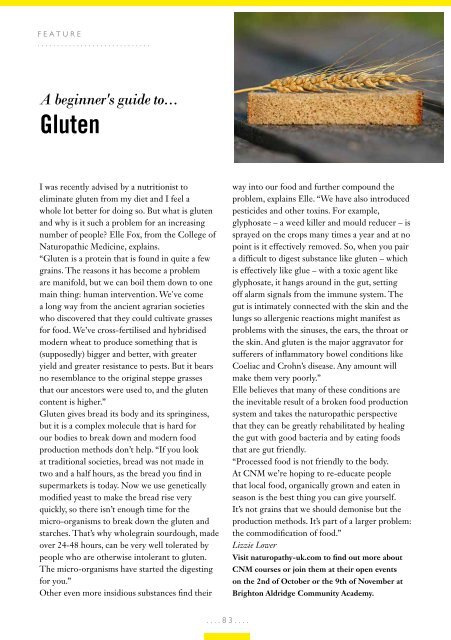Viva Brighton Issue #80 October 2019
- No tags were found...
You also want an ePaper? Increase the reach of your titles
YUMPU automatically turns print PDFs into web optimized ePapers that Google loves.
FEATURE<br />
.............................<br />
A beginner's guide to...<br />
Gluten<br />
I was recently advised by a nutritionist to<br />
eliminate gluten from my diet and I feel a<br />
whole lot better for doing so. But what is gluten<br />
and why is it such a problem for an increasing<br />
number of people? Elle Fox, from the College of<br />
Naturopathic Medicine, explains.<br />
“Gluten is a protein that is found in quite a few<br />
grains. The reasons it has become a problem<br />
are manifold, but we can boil them down to one<br />
main thing: human intervention. We've come<br />
a long way from the ancient agrarian societies<br />
who discovered that they could cultivate grasses<br />
for food. We’ve cross-fertilised and hybridised<br />
modern wheat to produce something that is<br />
(supposedly) bigger and better, with greater<br />
yield and greater resistance to pests. But it bears<br />
no resemblance to the original steppe grasses<br />
that our ancestors were used to, and the gluten<br />
content is higher.”<br />
Gluten gives bread its body and its springiness,<br />
but it is a complex molecule that is hard for<br />
our bodies to break down and modern food<br />
production methods don’t help. “If you look<br />
at traditional societies, bread was not made in<br />
two and a half hours, as the bread you find in<br />
supermarkets is today. Now we use genetically<br />
modified yeast to make the bread rise very<br />
quickly, so there isn’t enough time for the<br />
micro-organisms to break down the gluten and<br />
starches. That’s why wholegrain sourdough, made<br />
over 24-48 hours, can be very well tolerated by<br />
people who are otherwise intolerant to gluten.<br />
The micro-organisms have started the digesting<br />
for you.”<br />
Other even more insidious substances find their<br />
way into our food and further compound the<br />
problem, explains Elle. “We have also introduced<br />
pesticides and other toxins. For example,<br />
glyphosate – a weed killer and mould reducer – is<br />
sprayed on the crops many times a year and at no<br />
point is it effectively removed. So, when you pair<br />
a difficult to digest substance like gluten – which<br />
is effectively like glue – with a toxic agent like<br />
glyphosate, it hangs around in the gut, setting<br />
off alarm signals from the immune system. The<br />
gut is intimately connected with the skin and the<br />
lungs so allergenic reactions might manifest as<br />
problems with the sinuses, the ears, the throat or<br />
the skin. And gluten is the major aggravator for<br />
sufferers of inflammatory bowel conditions like<br />
Coeliac and Crohn’s disease. Any amount will<br />
make them very poorly.”<br />
Elle believes that many of these conditions are<br />
the inevitable result of a broken food production<br />
system and takes the naturopathic perspective<br />
that they can be greatly rehabilitated by healing<br />
the gut with good bacteria and by eating foods<br />
that are gut friendly.<br />
“Processed food is not friendly to the body.<br />
At CNM we’re hoping to re-educate people<br />
that local food, organically grown and eaten in<br />
season is the best thing you can give yourself.<br />
It’s not grains that we should demonise but the<br />
production methods. It’s part of a larger problem:<br />
the commodification of food.”<br />
Lizzie Lower<br />
Visit naturopathy-uk.com to find out more about<br />
CNM courses or join them at their open events<br />
on the 2nd of <strong>October</strong> or the 9th of November at<br />
<strong>Brighton</strong> Aldridge Community Academy.<br />
....83....

















